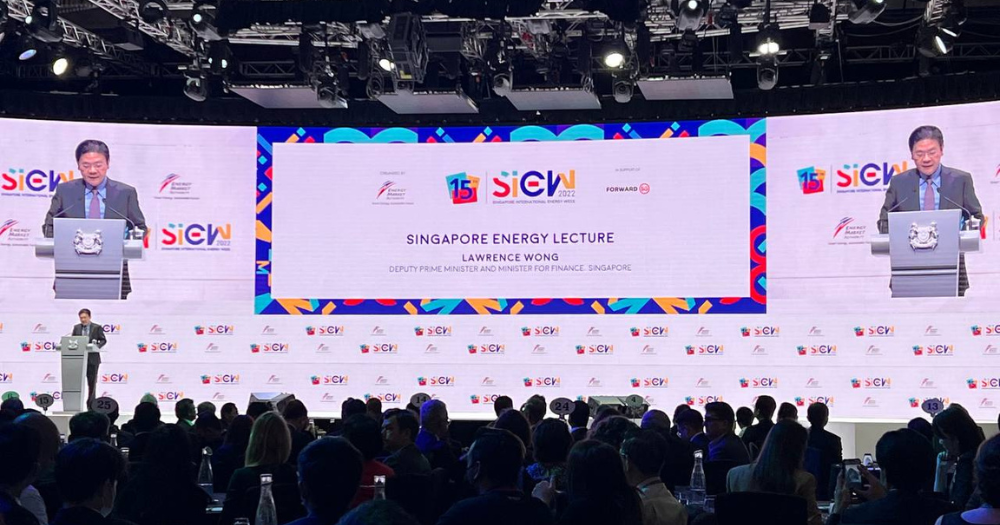Follow us on Telegram for the latest updates: https://t.me/mothershipsg
Deputy Prime Minister and Minister for Finance Lawrence Wong announced on Tuesday (Oct. 25) that Singapore will commit to the goal of achieving net-zero emissions by 2050, as well as aim to reduce emissions to 60 MtCO2e by 2030 after peaking emissions earlier.
The updates to Singapore's climate goals will be formally submitted to the United Nations Framework on Climate Change in the upcoming 27th United Nations Climate Change Conference (COP27) taking place in November.
Wong made the announcement during his Singapore Energy Lecture at the Singapore International Energy Week.
The new climate ambitions were first put forth by Wong during Budget 2022.
Contingent on continued international commitment
During his lecture, Wong highlighted the ongoing energy issues faced by countries around the world, noting disruptions caused by the war in Ukraine.
"But even as we seek to enhance energy security, we must redouble our efforts to green our energy sources", Wong said, adding that climate change is happening at an "even faster pace than before".
"In short, the world cannot afford to choose between an energy crisis and a climate crisis", Wong reiterated.
Speaking on the new climate goals, Wong pointed out that the net-zero by 2050 is a "stretch goal" for Singapore, considering the "limited options to deploy renewable energy at scale".
The ability of fulfilling Singapore's pledges therefore "depend on the continued international commitment by everyone to the Paris Agreement and their climate pledges", Wong shared.
"And because we are an alternative energy disadvantaged nation, it will also be contingent on the maturity of decarbonisation technologies and effective international cooperation", Wong added.
Enabling initiatives
Wong noted that the pursuit of net-zero by 2050 will require shifts in behaviour:
"To achieve net zero by 2050, we will need to encourage businesses and individuals to be more energy efficient, reduce energy consumption and carbon emissions, and adopt green energy alternatives. All this requires fundamental shifts in the behaviour of all households and firms."
Several initiatives will be enacted over the coming decades to enable the transition.
Carbon taxes will gradually be raised to S$50-S$80 per tCO2e by 2030.
Wong added that the government's approach is not to reduce or hold back the carbon taxes but to provide targeted relief to businesses and consumers, as they are mindful of the higher costs carbon taxes will bring.
The national hydrogen strategy, announced by Wong during his lecture, will explore the adoption of low-carbon hydrogen as a source of green energy in sectors such as power, maritime and aviation.
GreenGov.SG will see the public sector aim to achieve net-zero emissions in its operations ahead of schedule in 2045.
The upcoming Jurong Lake District is also expected to be a net-zero development by 2045.
Wong also pointed to the importance of green financing, noting that "several trillions of dollars in infrastructure investments" will be needed in Southeast Asia alone to enable the energy transition.
Previous goals
Previously, Singapore aimed to peak emissions at 65MtCO2e by 2030, as part of its Nationally Determined Contribution (NDC).
The Long-Term Low Emissions Development Strategy then stipulates that by 2050, Singapore's emissions will be halved to 33MtCO2e and thereafter achieve net-zero emissions as soon as viable in the second half of the century.
The updated climate goals therefore represent a more explicit commitment to attaining net-zero emissions.
Prior to Tuesday's announcement, the government engaged with stakeholders under the Singapore Green Plan 2030.
A public consultation was also launched in September.
Singapore's emissions in 2019 was 51.5MtCO2e.
In 2020, it was 52.8MtCO2e.
Top image via Gawain Pek
If you like what you read, follow us on Facebook, Instagram, Twitter and Telegram to get the latest updates.
